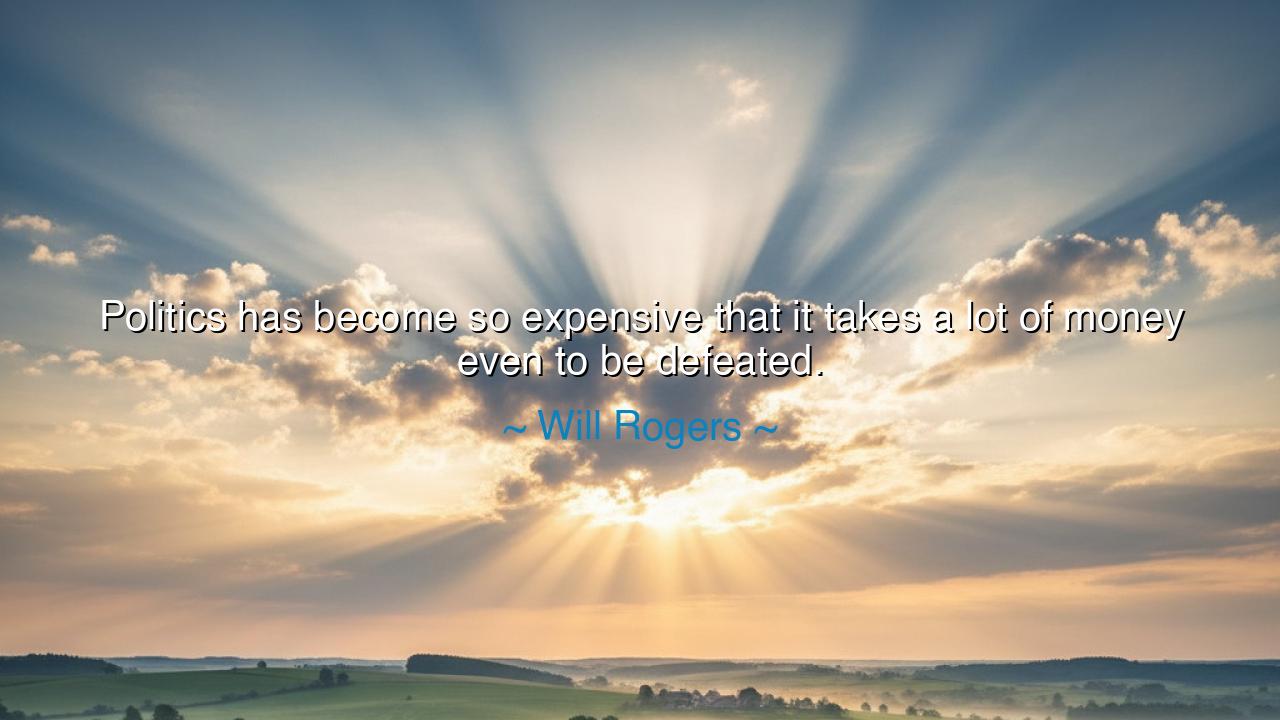
Politics has become so expensive that it takes a lot of money






The words of Will Rogers — “Politics has become so expensive that it takes a lot of money even to be defeated.” — fall like a jest, yet behind the laughter hides a truth as sharp as a blade. With humor, Rogers unmasks the corruption of a system where victory and even defeat are purchased with coin, and where the sacred duty of leadership is shackled to the wealth of those who can afford to play the game.
The meaning of his words is this: in the realm of politics, merit alone is seldom enough. The man of vision, the woman of courage, cannot stand upon the stage of power unless they first gather treasures to feed the machinery of campaigns. And even then, fate may strike them down, leaving them with empty hands and emptied coffers. To be defeated is not only to lose power, but to lose after spending fortunes, after draining one’s gold for the privilege of hearing the people say, “No.”
History gives us vivid examples. Recall William Jennings Bryan, who ran three times for the presidency of the United States. He spoke with fire, he moved multitudes with his words, yet each time he fell short. Though beloved by many, he discovered that speeches and conviction were not enough to overcome the immense resources of his opponents. His defeats stand as living proof of Rogers’s jest: that even the noblest fighter must pay dearly for the chance to lose.
Yet there is also sorrow in this truth. For when money becomes the gatekeeper of power, the poor but wise are silenced, and the wealthy but corrupt are magnified. The spirit of democracy, meant to give voice to all, risks becoming an auction where only the richest bids are heard. Rogers laughed, but his laughter was edged with grief — for he saw that the contest of ideas was often drowned in the clinking of coins.
Let this wisdom be carried forward: the cost of politics is not counted only in dollars, but in the purity of a nation’s soul. When gold outweighs truth, when fortune outweighs merit, the people themselves are defeated, no matter who wins the election. Therefore, let future generations remember Rogers’s jest as a warning — that a democracy must guard itself, lest it become a market where the highest bidder buys the crown, and the voice of the common man is lost in the shadow of wealth.






NMSang Nguyen Minh
This quote raises an uncomfortable truth about the way politics operates today. If you need money just to be defeated, then what happens to the idea of public service and selfless dedication to the country? Does the current system push out those who want to serve but can’t afford to compete? What would it take to shift the focus of politics away from fundraising and back to policy and people?
BHDuong Bao Hoang
I find this quote both funny and disturbing at the same time. The fact that it takes money even to be defeated suggests that the system is more focused on fundraising than on genuine democratic engagement. What would politics look like if we could reduce the influence of money on campaigns? Could public financing or stricter campaign finance laws help create a more level playing field for candidates?
TNChu thi nga
Will Rogers’ quote makes me reflect on the state of American politics today. Is this escalating cost of politics contributing to voter apathy? If only candidates with big budgets can run viable campaigns, how are we excluding voices from communities with fewer resources? How can we fix a system where money is required just to be heard, let alone to win?
TH09. Huynh Thi Thanh Hieu
This quote strikes me as a critique of the increasing commercialization of politics. How did we get to a point where political campaigns are more about raising money than about representing the interests of the people? Does this mean that only the wealthy or well-funded can truly compete in elections, while the average citizen is shut out of the process?
BCBi Cutii
Will Rogers' quote perfectly captures the high cost of modern politics. It’s incredible to think that in order to lose, you still need to spend a huge amount of money. What does this say about the influence of money on political processes? Can true democracy exist when financial resources play such a dominant role in determining who runs for office and who gets heard?